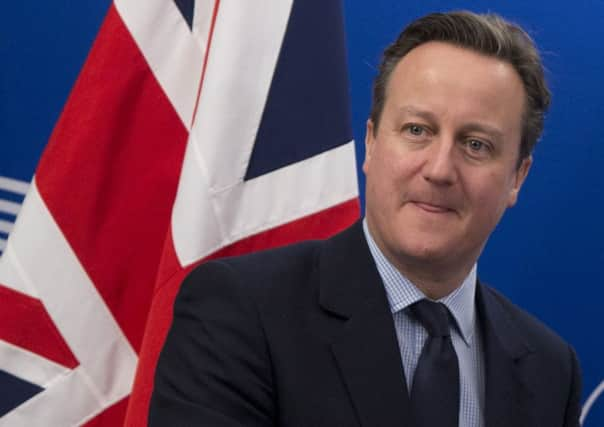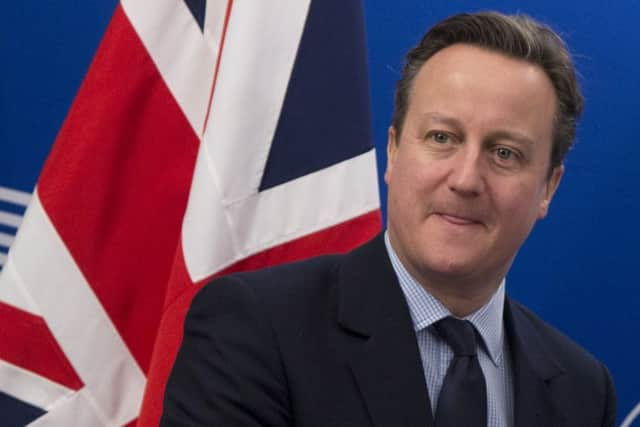PM optimistic about crunch EU summit


The Prime Minister insisted there was a “good basis for agreement” but EU officials made clear that key details of his reform package remain to be nailed down.
European Council president Donald Tusk has also warned there was “no guarantee” a deal would be reached.
Advertisement
Hide AdAdvertisement
Hide AdIn an eve-of-summit letter, Mr Tusk told EU leaders he was releasing a new draft of his package of proposed reforms, saying: “The negotiations are very advanced and we must make use of the momentum. There will not be a better time for a compromise.”


Failure to reach a deal at the European Council gathering would be “a defeat both for the UK and the European Union, but a geopolitical victory for those who seek to divide us”, he warned.
Despite the warning, Mr Cameron remained optimistic about the summit following a late-evening phone call with Mr Tusk.
A Downing Street spokeswoman said: “They agreed that good progress had been made in all four areas of our renegotiation, and that the draft texts presented a good basis for agreement at tomorrow’s European Council, subject to the satisfactory resolution of outstanding issues.”
Advertisement
Hide AdAdvertisement
Hide AdMr Cameron will be making a last-ditch push to overcome eastern European objections to changes to welfare rules for migrant workers as well as resistance from the likes of France and Belgium to his demand for EU treaties to be rewritten to incorporate British gains from the renegotiation.


“This is crunch time,” said one UK official. “We need to secure the right settlement for the British people.”
The Prime Minister was boosted on Wednesday by German chancellor Angela Merkel’s declaration that most of his demands were “justified and necessary”, while French PM Manuel Valls said authorities in Paris “believe and hope” it will be possible to keep the UK in the EU.
British withdrawal would be “a shock for Europe, but more importantly a shock to the way the world sees Europe, which is already in crisis,” Mr Valls told the French parliament.
Advertisement
Hide AdAdvertisement
Hide AdThe summit begins after official ONS figures on Wednesday found the number of EU migrants working in this country increased by 215,000 to just over two million in the last quarter of 2015 compared with a year earlier.
The first session in Brussels will provide an opportunity for each of the 28 member states to set out their views on the UK demands, following a whirlwind round of diplomacy which has seen Mr Cameron and Mr Tusk separately visit capitals around the continent over recent weeks.
Officials are then expected to work late into the night hammering out the shape of a possible final deal, while leaders discuss the migration crisis over dinner.
On Friday morning - in what Brussels wags are calling the “English breakfast” - the leaders will return to the table to thrash out remaining points of difference and determine whether they can craft a package acceptable to all.
Advertisement
Hide AdAdvertisement
Hide AdMr Tusk confirmed on Wednesday night that Turkish prime minister Ahmet Davutoglu has pulled out of the summit in the wake of a deadly car bomb blast in Ankara.
Possible obstacles to a deal include proposed reforms on welfare for EU migrants and child benefit, while in other areas, like measures to boost EU competitiveness, all 27 leaders are thought to be “in the basket”.
If Mr Cameron gets a deal, he will fly back to London for a special Cabinet meeting to agree the Government’s position and name a date for the referendum - widely expected to be June 23.
From that point, Eurosceptic ministers will be freed to campaign for Brexit, with all eyes on suspected waverers like Michael Gove and Boris Johnson to see which side they back.
Advertisement
Hide AdAdvertisement
Hide AdHowever, UK officials said the PM remained ready to walk away from Brussels without agreement if he is not satisfied with what he is offered.
In a sign of the difficulties still facing Mr Cameron in Brussels, the final draft of Mr Tusk’s proposals indicated there was still no agreement on the thorny issue of enshrining his demands in the EU’s treaties.
A leaked text of the document showed that mentions of treaty changes in relation to economic governance - protections for non-eurozone countries and the City of London - and the UK’s opt-out from ever closer political union remained inside square brackets, signalling that there is no agreement.
The leaked text obtained by The Guardian also signals a fresh battle with eastern European nations over the application of the welfare curbs called for by Mr Cameron.
Advertisement
Hide AdAdvertisement
Hide AdA provision that could have made the benefit curbs available only to Britain and other countries that did not impose transitional restrictions on migration when the EU expanded in 2004 has been removed, suggesting they will now apply to all member states.
This will be very poorly received by the Visegrad group of countries in eastern and central Europe - Poland, Hungary, the Czech Republic and Slovakia.
The Financial Times reported that there was also the potential for the European Parliament to have a say on whether the emergency brake on in-work benefits could be applied.
Previous drafts had referred to a “Council implementing act” - signifying a decision by the member states, bypassing Euro MPs - on whether to apply the brake, but the latest version refers to a more general “authorisation”, potentially involving the parliament.